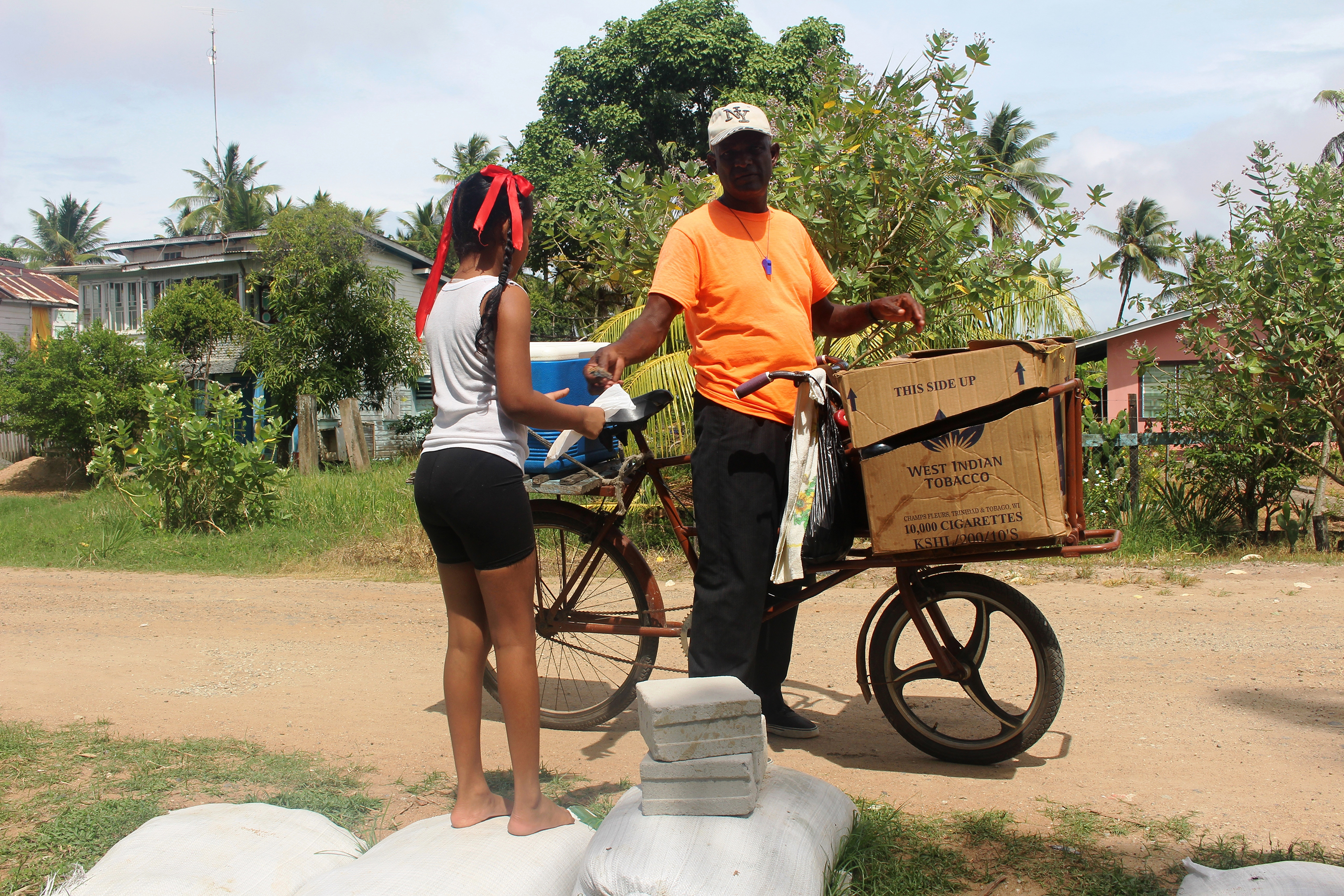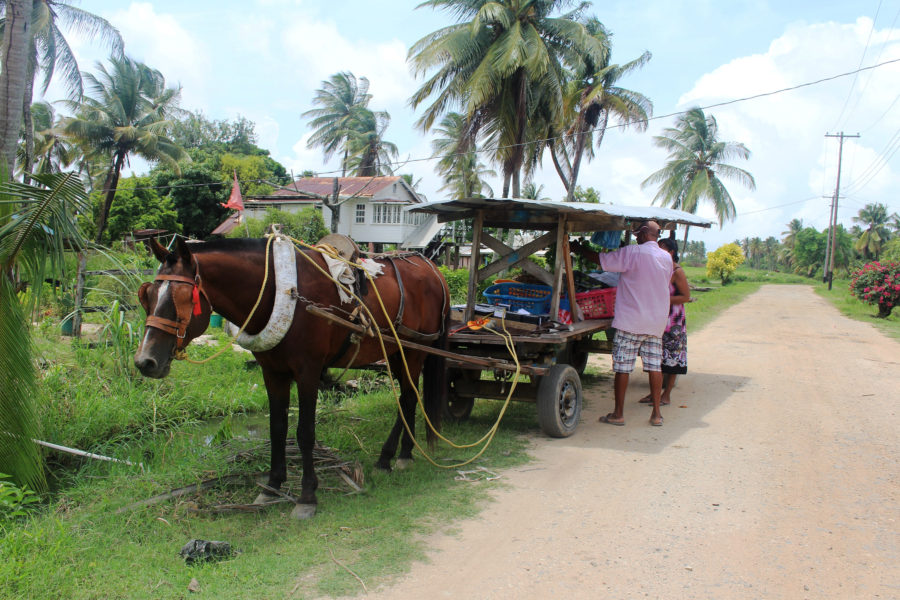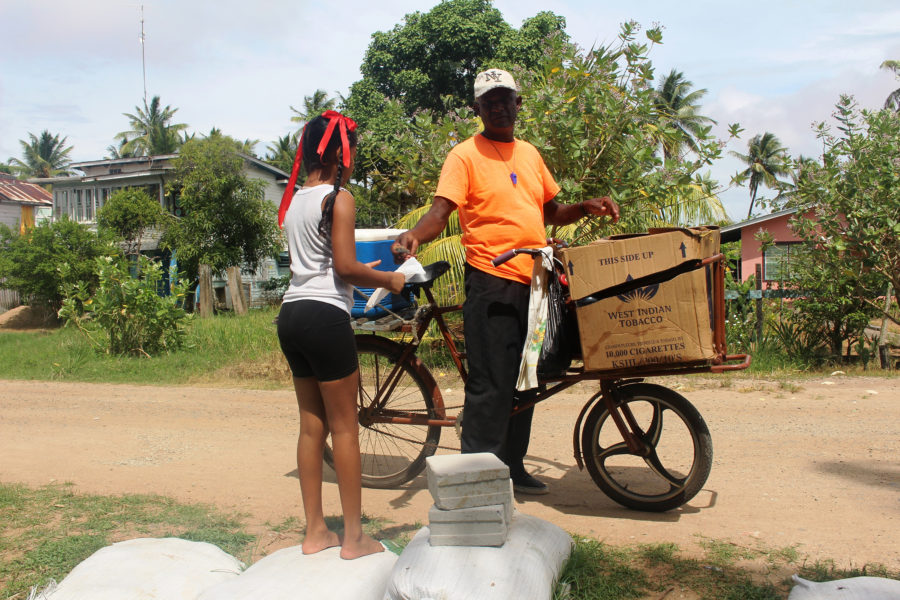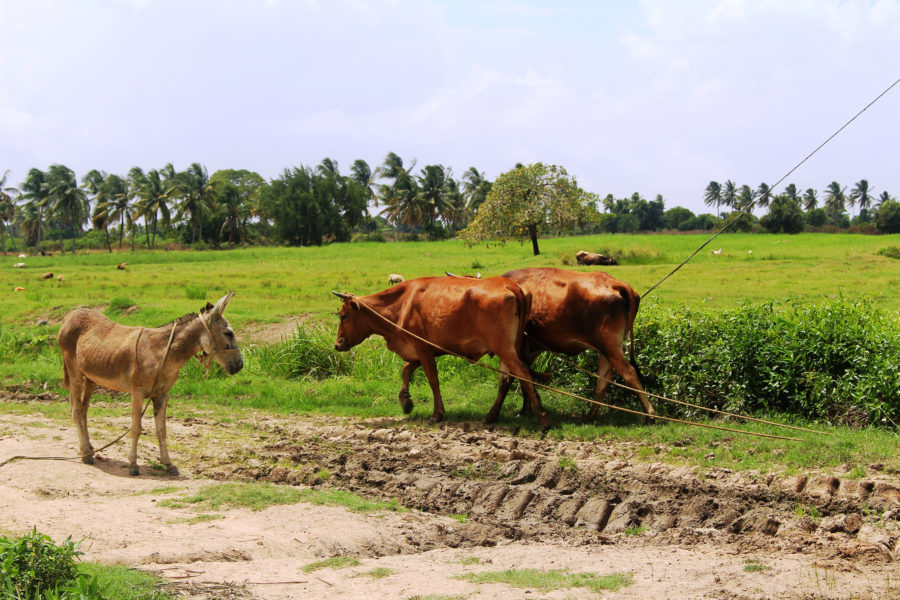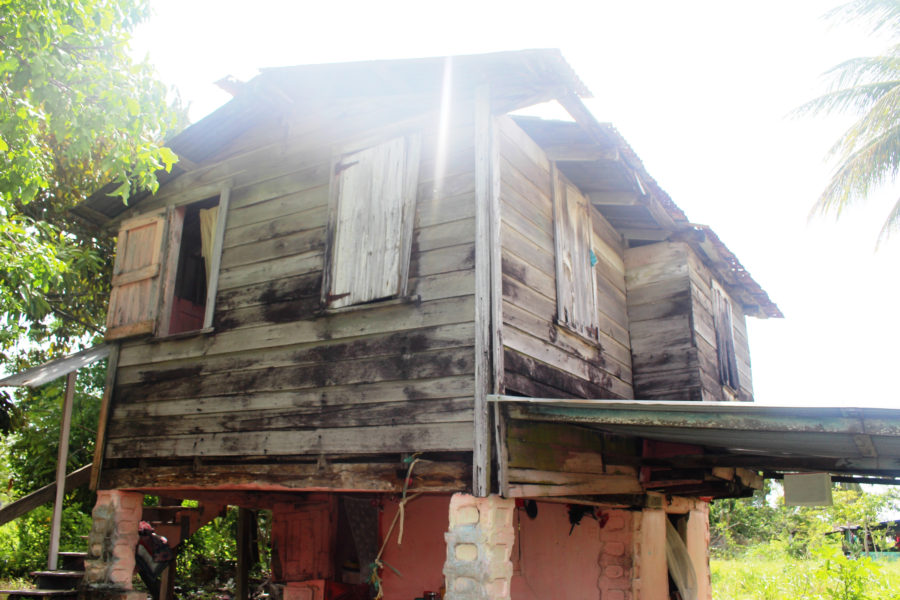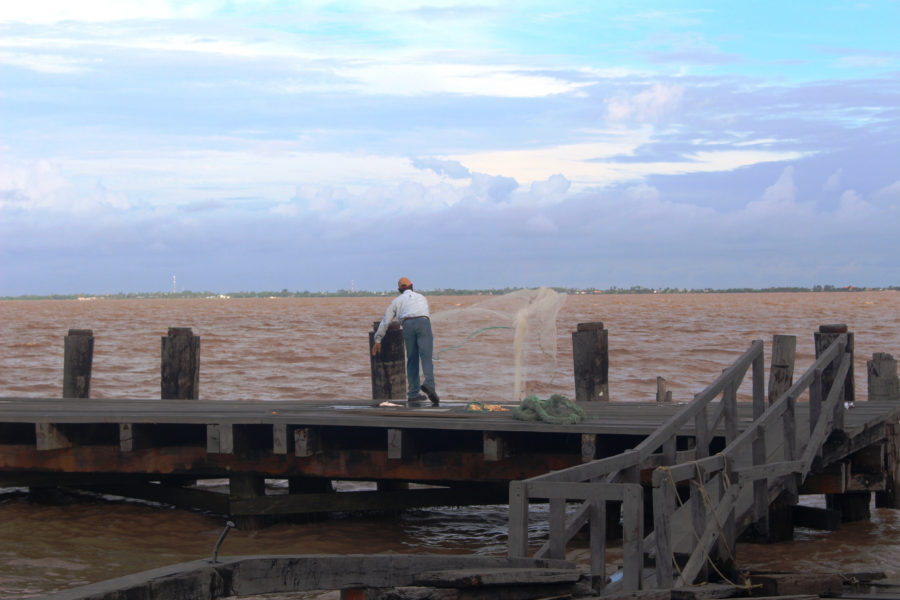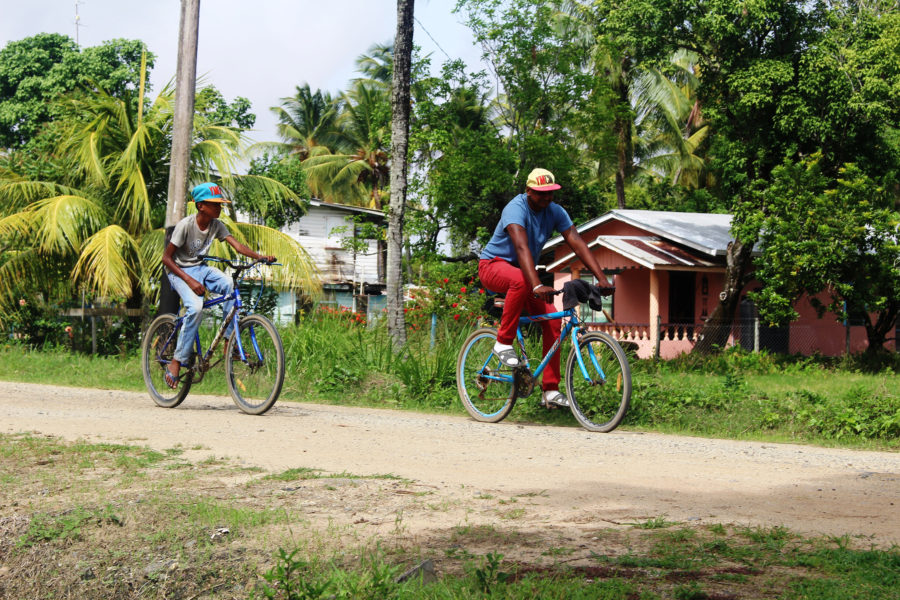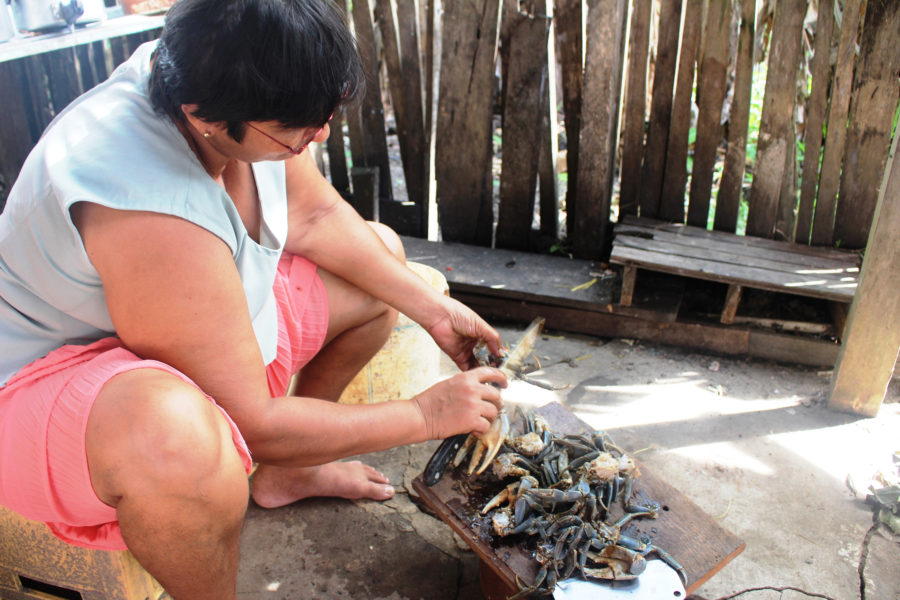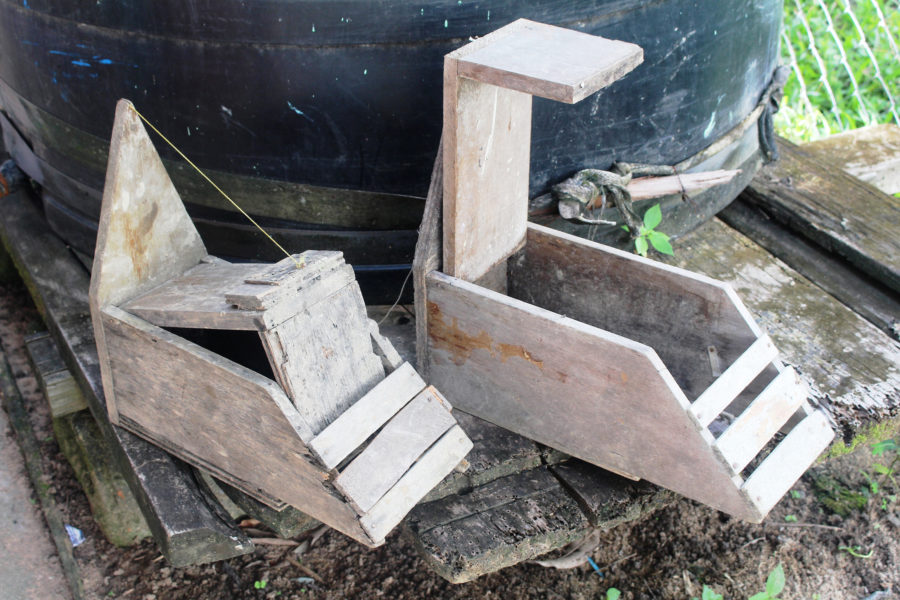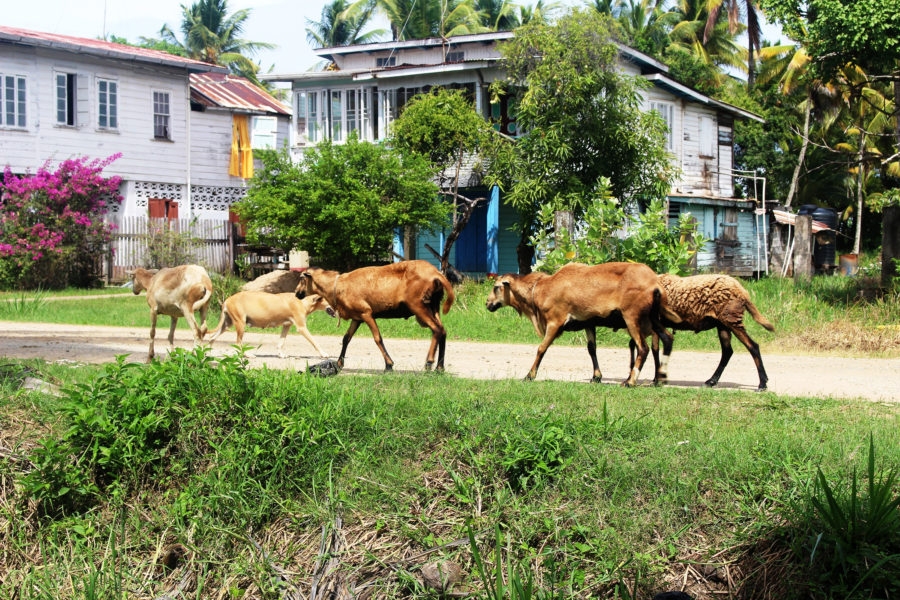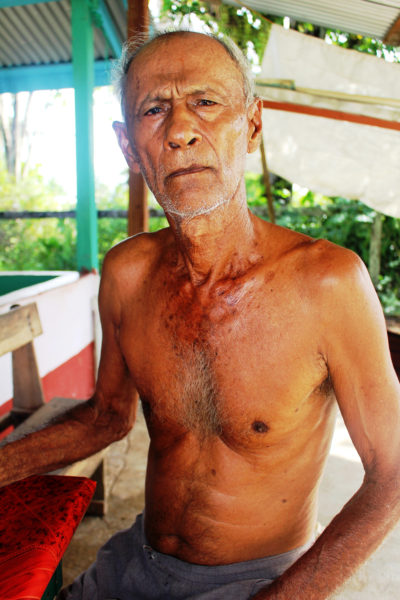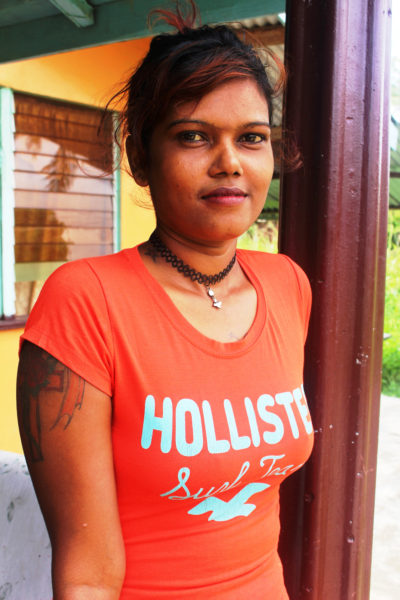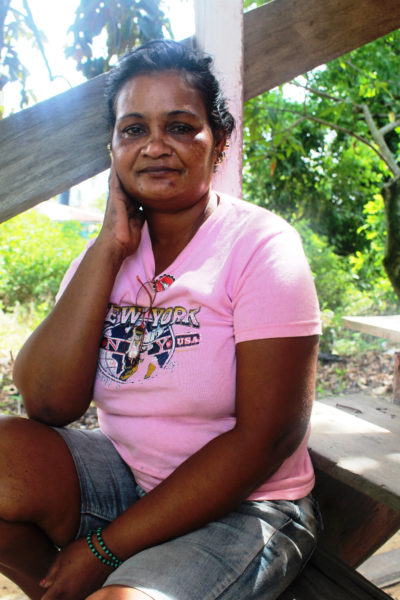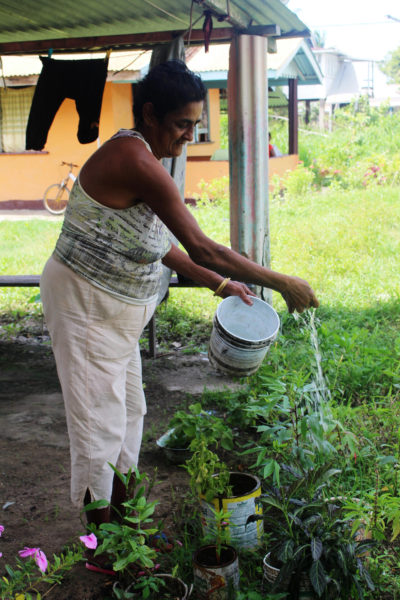Endeavour is on the eastern end of the island of Leguan in the Essequibo River and home to less than 200 residents, most of whom farm for a living.
To get to Leguan once you arrive at Parika, you could either use the ferry, MV Makouria, or take a speedboat, which gets you to the island in 15 minutes. I chose the latter and found myself seated next to a worker employed on the Makouria, who had missed the vessel by half an hour. The speedboat had no shed, so the operator gave each passenger a piece of leatherette to cover with, which we held tightly in our hands, to protect us from the fury of the Essequibo pelting in at us. Over the noise of the outboard engine, the Makouria worker loudly explained that when travelling to Leguan via speedboat, one should sit on the left hand side of the boat as water would come into the boat on the right and do the reverse on the return journey. I was, unfortunately, already seated on the wrong side.
At the Leguan Stelling taxis wait to take passengers to their respective villages. Five minutes later, I was in Endeavour and the first sight was a pair of hefty-looking oxen walking through a dam. Farm animals roaming the village is common. A quick browse reveals that people do not care for fences and the few who do have fences, see no need for gates.
A horse drawn cart parked at the side of the road attracted a few customers. One of them was Annette Ragnauth, who had left her home in Canefield (the last village on the eastern side) 13 years ago after getting married. She lives with her husband and three sons in Endeavour.
The carts and mobile vans, Ragnauth said, usually pass through to provide the villagers with necessities, but there isn’t much need since many persons have their own farms or kitchen gardens.
“Here you can plant your own greens,” she said. “My husband would get fish in the backdam: hassa, hurri, patwa, sunfish and shrimp.” In August, when the crabs are marching they make the most of them.
While we talked, her sons returned home from school having had only half-day sessions and sat inside watching the television. They access 12 television channels. Her youngest son attends the Eastern Leguan Primary and her two older sons, the community high.
Though it was the start of the rainy season, the sun shone brightly, but breezes kept the place cool. Endeavour, Ragnauth said, would flood if there are heavy downpours but the water doesn’t remain on land for long. When it rains heavily, she explained, drivers find it difficult to get in and out of the village, and in dry weather the road still poses a problem as it makes it easier for the wind to pick up the red dust and deposit it wherever, like on her nicely cleaned louvres. But she said Endeavour is a lovely place to live and she hopes the road can be upgraded to make life easier.
“Long ago the old people had mud houses according to my grandparents,” Anita Sankar, Ragnauth’s next door neighbour began. “Some of the houses had bamboo for foundation which they paste mud on and around and they use the troolie for the roof.
“When I was little, life was so good. My parents use to plant a lot of rice. We use to go with them when they had to harvest it and use to help them cut the rice, go-around the bulls to mash the straws….long ago we didn’t had combine and tractor. After we would go swimming and have bush cook. Life was hard but still good. We use the flambeau lamp to get light and use to daub the bottom house. People still daub today but they don’t use them hands like we used to long time; they use mop stick.”
She added that horse carts were the mode of transportation then; either that or you walked, the most common mode. Residents today usually call a taxi, though most persons prefer to use their bicycles to get around; school children would ride or walk to their respective schools. There is one bus, the woman explained, that passes through the village three times a day (6 am, 10 am and 2 pm) to take persons to catch the Makouria or to transport persons getting off. Often, the bus is only half full; it sometimes remains empty on some of its runs.
Nearby, Sankar’s eight-year-old daughter Kelly, home after a half-day session as well and her mother-in-law Shakila Mahase eavesdropped on our conversation. Mahase, who lives in a flat downstairs, pointed to some of the boards on the house, which lend character to the structure. She said they were taken from a logie. According to the older woman, 58 years ago when she married her husband and he took her to Endeavour to live with him and his family, she met a four-room logee with a gallery (a narrow hallway passage) attached, which they used as a kitchen.
Both women agreed that living in Endeavour is a privilege as they are able to farm and do not have to buy everything they need. Another advantage they boasted about was living in a crime-free and peaceful environment where neighbours are always on the lookout for each other.
Rice farmers, Sankar said, are still trying to keep things afloat. Though there is always a demand for rice, the price paid for paddy is measly. “When the previous government was in power we got $4,000 for a bag paddy…. But now we get only $1,500 a bag. I’m appealing to the government to raise the price for paddy ’cause we still have to find money to take care of our expenses: buy fertilizers, medicine, purchase paddy and pay workmanship. When the paddy sell so cheap, you ain’t making anything.”
Leaving the family, we found Patsy Reedon seated outside her yard on a bench. In 1962 when she married, she left her home in Aurora on the Essequibo Coast for the island.
“In those days it was similar to life on the coast so it was easy to adjust,” Reedon said. The only adjustment she found a bit difficult was missing her family, but there was nothing to be done except for writing letters and even the letters came and went seldom. Those were the days of the telegram, but according to Reedon, telegrams weren’t sent unless there was an emergency or the matter was urgent. “You use to go to the post office, you tell them to send the telegram, tell them who you sending to and what happened; if the person sick or dead. By the time you send it, they get it only a few minutes later. People never really send telegram just so, you usually had a cause….like say anybody sick and not them kinda plaything sick,” she stated.
Whenever the rare opportunity arrived for her to visit her relatives, she took the steamer, paying a return fare of $2.65 from Leguan to Adventure.
The 72-year-old widow recalled never having to work in the fields before but arriving on Leguan and finding herself working side by side with her husband, planting and cutting rice.
Speaking about how different it is today, she said, “The earlier days had more open [minded] people who socialized more. The older people used to be more loving and kind. Nowadays generation ain’t got that; number one they ain’t got manners.”
Over the years, Reedon has seen Endeavour develop to having a road, potable water and electricity. Asking whether she saw need for further development, she replied, “If any other developments come, I welcome it but if it doesn’t, it’s still okay.”
Eighty-two-year-old Basdeo is the oldest in the village and has only one name. He was born in Amsterdam, Leguan, the neighbouring village. Now retired, he reminisced about backdam life.
“Long time backdam life was very nice,” he said. “You work hard but you use to get everything for yourself. Nowadays you work hard and you not getting anything. Long time even them lady work in the backdam. Them work backdam today and tonight they get baby and a week later they back in the backdam working again.”
Basdeo said his work day started at five in the morning and ran until seven at night. When it was time to harvest, the houses were empty as men, women, and children were all in the backdam working together. They were no combines, so they cut the rice with grass knives. At the end of the crop, he found other work around the backdam and village to do but according to the man, no matter how hard you worked, you lived a life of abundance.
He remembers well, going with his bull cart to Enterprise, another village three miles away, to draw water from the well to drink. This wasn’t the norm as they normally used rain water; it was during the dry season that he made such trips. He said he had grown up hearing his father talk about the dry seasons before there were any wells, when they depended on a vessel called the Bazra to bring black water from Bartica for the people on the island.
Speaking of long ago, he shared that the men used to wear a piece of stretchy clothing called ‘singlets’ which their put around their necks and went all the way to their ankles. He laughed as he remembered wearing them himself.
This led him to talking about the young girls back then, who, after school, learnt sewing; he lamented that this does not happen anymore.
Another distressing thing for Basdeo, although he doesn’t farm anymore, is the way the rice industry has declined. “People just stop planting rice. It got guys with more than 80 acres of rice but because they barely making a profit, they just stop planting,” he lamented.
